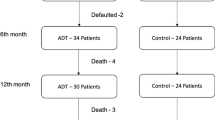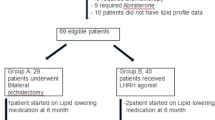Abstract
Purpose
Androgen deprivation therapy (ADT) for prostate cancer (PCa) may increase peripheral insulin resistance, induce type 2 diabetes, change body composition, and alter lipoprotein profile. Some studies have reported an association between ADT and increased risk of cardiovascular events. It is known that serum level of fibrinogen (SF) is associated with coronary artery disease and increased cardiovascular risk (CVR). The aim of this study is to determine the increase in SF and C-reactive protein (CRP) of PCa patients on ADT.
Methods
Ninety-seven patients with locally advanced PCa (study group) were analyzed [mean age 73.4 years ± 6.3 SD, mean prostate specific antigen (PSA) 15.4 ng/ml ± 7.5 SD]. They were examined with blood chemistry including serum cholesterol (CHL), high density lipoproteins (HDL), low density lipoproteins (LDL), very low density lipoproteins, triacylglycerol (TAG), serum fibrinogen (FB), CRP and serum fasting glucose (SFG), serum testosterone, free testosterone at baseline, and after 12 months of ADT.
Results
Patients after 12 months of ADT (study group) had significantly higher overall serum CHL (p < 0.001), higher LDL (p = 0.01), higher FB (p < 0.001), higher serum SFG (p = 0.03) in comparison with the control group. Increase in HDL (p = 0.245) and CRP (p = 0.1) was not significant. Two patients from the study group were diagnosed with new-onset diabetes.
Conclusions
This is the first study that demonstrates the significant increase in FB in PCa patients on ADT, while CRP as inflammatory marker did not increase. Elevation of SF may contribute to increased CVR in PCa patients. Further prospective studies are warranted to confirm this association.
Similar content being viewed by others
References
Jemal A, Siegel R, Xu J, Ward E (2010) Cancer statistics 2010. CA Cancer J Clin 60:277–300
Surveillance Epidemiology and End Results. SEER Stat Fact Sheets: Prostate Cancer. 2008 Available at: http://seer.cancer.gov/statfacts/html/prost.html Accessed 25 July 2011
Tangen CM, Faulkner JR, Crawford ED et al (2003) Ten-year survival in patients with metastatic prostate cancer. Clin Prostate Cancer 2:41–45
Huggins C, Stevens RE Jr, Hodges CV (1941) Studies on prostatic cancer. II. The effects of castration on advanced carcinoma of the prostate gland. Arch Surg 43:209–223
Chodak GW, Keane T, Klotz L (2002) Critical evaluation of hormonal therapy for carcinoma of the prostate. Urology 60:201–208
Bolla M, Collette L, Blank L et al (2002) Long-term results with immediate androgen suppression and external irradiation in patients with locally advanced prostate cancer (an EORTC study): a phase III randomised trial. Lancet 360:103–106
Chodak GW (1998) Comparing treatments for localized prostate cancer: persisting uncertainty. JAMA 280:1008–1010
Shahinian VB, Kuo YF, Freeman JL, Orihuela E, Goodwin JS (2005) Increasing use of gonadotropin-releasing hormone agonists for the treatment of localized prostate carcinoma. Cancer 103:1615–1624
Green HJ, Pakenham KI, Headley BC et al (2004) Quality of life compared during pharmacological treatments and clinical monitoring for non-localized prostate cancer: a randomized controlled trial. BJU Int 93:975–979
Shahinian VB, Kuo YF, Freeman JL, Goodwin JS (2006) Risk of the ‘‘androgen deprivation syndrome’’ in men receiving androgen deprivation for prostate cancer. Arch Intern Med 166:465–471
Alibhai SM, Gogov S, Allibhai Z (2006) Long-term side effects of androgen deprivation therapy in men with non-metastatic prostate cancer: a systematic literature review. Crit Rev Oncol Hematol 60:201–215
Ziaran S, Goncalves FM, Breza J (2011) Bone mineral density, pathological fractures and bisphosphonate therapy in prostate cancer patients on androgen deprivation therapy. Endocr Regul 45:199–204
Daniell HW, Dunn SR, Fergusson DW, Lomas G, Niazi Z, Srtatte PT (2000) Progressive osteoporosis during andorgen deprivation therapy for prostate cancer. J Urol 163:181–186
Oefelein MG, Ricchiuti V, Conrad W, Resnick MI (2002) Skeletal fractures negatively correlate with overall survival in men with prostate cancer. J Urol 168(3):1005–1007
Smith MR, Lee H, Nathan DM (2006) Insulin sensitivity during combined androgen blockade for prostate cancer. J Clin Endocrinol Metab 91:1305–1308
Basaria S, Muller DC, Carducci MA, Egan J, Dobs AS (2006) Hyperglycemia and insulin resistance in men with prostate carcinoma who receive androgen-deprivation therapy. Cancer 106(3):581–588
Smith JC, Bennett S, Evans LM, Kynaston HG, Parmar M, Mason MD, Cockcroft JR, Scanlon MF, Davies JS (2001) The effects of induced hypogonadism on arterial stiffness, body composition, and metabolic parameters in males with prostate cancer. J Clin Endocrinol Metab 86:4261–4267
Haseen F, Murray LJ, Cardwell CR, O’Sullivan JM, Cantwell MM (2010) The effect of androgen deprivation therapy on body composition in men with prostate cancer: systematic review and meta-analysis. J Cancer Surviv 4(2):128–139
Danesh J, Lewington S, Thompson SG, Lowe GD, Collins R, Kostis JB, Wilson AC, Folsom AR, Wu K, Benderly M et al (2005) Plasma fibrinogen level and the risk of major cardiovascular diseases and nonvascular mortality: an individual participant meta-analysis. JAMA 294(14):1799–1809
Kaptoge S, White IR, Thompson SG, Wood AM, Lewington S, Lowe GD, Danesh J (2007) Associations of plasma fibrinogen levels with established cardiovascular disease risk factors, inflammatory markers, and other characteristics: individual participant meta-analysis of 154,211 adults in 31 prospective studies: the fibrinogen studies collaboration. Am J Epidemiol 166(8):867–879
Palmieri V, Celentano A, Roman MJ, de Simone G, Best L, Lewis MR, Robbins DC, Fabsitz RR, Howard BV, Devereux RB (2003) Relation of fibrinogen to cardiovascular events is independent of preclinical cardiovascular disease: the strong heart study. Am Heart J 145(3):467–474
Yan RT, Fernandes V, Yan AT, Cushman M, Redheuil A, Tracy R, Vogel-Claussen J, Bahrami H, Nasir K, Bluemke DA et al (2010) Fibrinogen and left ventricular myocardial systolic function: the multi-ethnic study of atherosclerosis (MESA). Am Heart J 160(3):479–486
Fibrinogen Studies Collaboration (2005) Plasma fibrinogen level and the risk of major cardiovascular diseases and nonvascular mortality: an individual participant meta-analysis. JAMA 294:1799–1809
The Emerging Risk Factors Collaboration (2010) C-reactive protein concentration and the risk of coronary heart disease, stroke, and mortality. Lancet 375:132–140
Lowe GDO (1995) Fibrinogen and cardiovascular disease: historical introduction. Eur Heart J 16(Suppl A):2–5
Khosla S, Atkinson EJ, Dunstan CR, O’Fallon WM (2002) Effect of estrogen versus testosterone on circulating osteoprotegerin and other cytokine levels in normal elderly men. J Clin Endocrinol Metab 87:1550–1554
Maggio M, Blackford A, Taub D, Carducci M, Ble A, Metter EJ, Braga-Basaria M, Dobs A, Basaria S (2006) Circulating inflammatory cytokine expression in men with prostate cancer undergoing androgen deprivation therapy. J Androl 27:725–728
Elsberger B, Lankston L, McMillan DC, Underwood MA, Edwards J (2011) Presence of tumoural C-reactive protein correlates with progressive prostate cancer. Prostate Cancer Prostatic Dis 14(2):122–128
Danesh J, Collins R, Peto R, Lowe GDO (2000) Haematocrit, viscosity, erythrocyte sedimentation rate: meta-analyses of prospective studies of coronary heart disease. Eur Heart J 21:515–520
Conflict of interest
I certify that there is no actual or potential conflict of interest in relation to this article.
Author information
Authors and Affiliations
Corresponding author
Rights and permissions
About this article
Cite this article
Ziaran, S., Goncalves, F.M. & Breza, J. Patients with prostate cancer treated by ADT have significantly higher fibrinogenemia than healthy control. World J Urol 31, 289–292 (2013). https://doi.org/10.1007/s00345-012-0926-x
Received:
Accepted:
Published:
Issue Date:
DOI: https://doi.org/10.1007/s00345-012-0926-x




